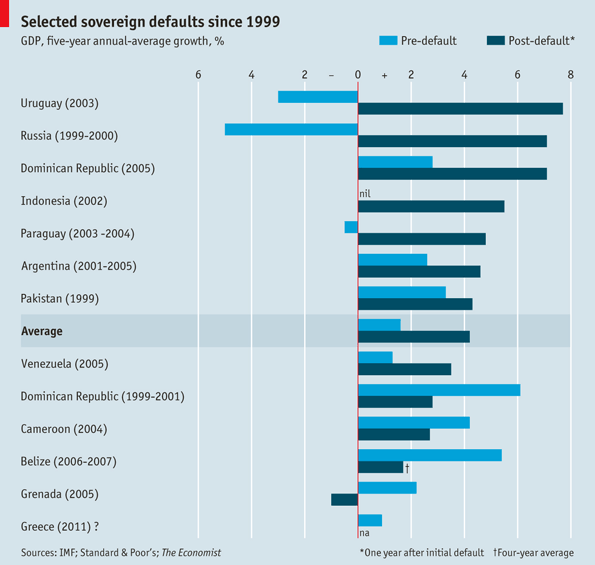| 主权(债务)违约和国民生产总值 违约还是不违约? Jun 20th 2011, 14:03 by The Economist online 一些国家从拖欠债务中受益 理论上讲,担心主权(债务)违约造成经济损失应当在惩罚打算拒绝偿还债务的国家中起到重要作用。不过,随着违约国家发现它们只是一段时间不被进入市场,任何对违规的(增长)惩罚都是短暂的。在2001年12月违约之后第二年,阿根廷的GDP下降了10.9%。不过随后几年,它的经济迅速反弹。乌拉圭、俄罗斯和印度尼西亚在各自违约之后,表现都相当不错。不过,经济学家警告不能将这些数字解读为“违约促进增长”。他们指出,通常在经济周期的最糟时刻才会出现违约,所以,按照违约国家的标准,违约前几年经济状况就已经欠佳了。此外,国家之间的情况差异很大。格林纳达、喀麦隆、伯利兹或多米尼加共和国在违约之后表现糟糕,对于乌拉圭违约后的繁荣,它们很难有什么慰藉。
 |

A sovereign default is a failure by the government of a sovereign state to pay back its debt in full.
If potential lenders or bond purchasers begin to suspect that a government may fail to pay back its debt, they may demand a high interest rate in compensation for the risk of default. A dramatic rise in the interest rate faced by a government due to fear that it will fail to honor its debt is sometimes called a sovereign debt crisis. Governments may be especially vulnerable to a sovereign debt crisis when they rely on financing through short-term bonds, since this creates a situation of maturity mismatch between their short-term bond financing and the long-term asset value of their tax base. They may also be vulnerable to a sovereign debt crisis due to currency mismatch if they are unable to issue bonds in their own currency, as a decrease in the value of their own currency may then make it prohibitively expensive to pay back their foreign-denominated bonds (see original sin).[citation needed]
Since a sovereign government, by definition, controls its own affairs, it cannot be obliged to pay back its debt. Nonetheless, a government which defaults may be excluded from further credit; some of its overseas assets may be seized; and it may face political pressure from its own domestic bondholders to pay back its debt. Therefore governments rarely default on the entire value of their debt. Instead, they often enter into negotiations with their bondholders to agree on a delay or partial reduction of their debt payments, which is often called a debt restructuring or 'haircut'.
The International Monetary Fund often assists in sovereign debt restructurings. To ensure that funds will be available to pay the remaining part of the sovereign debt, it often makes its loans conditional on austerity measures within the country, such as tax increases or reductions in public sector jobs and services. A recent example is the Greek bailout agreement of May 2010.
 |小黑屋|手机版|网站地图|关于我们|ECO中文网
( 京ICP备06039041号 )
|小黑屋|手机版|网站地图|关于我们|ECO中文网
( 京ICP备06039041号 ) 
GMT+8, 2025-11-13 14:38 , Processed in 0.248680 second(s), 29 queries .
Powered by Discuz! X3.3
© 2001-2017 Comsenz Inc.